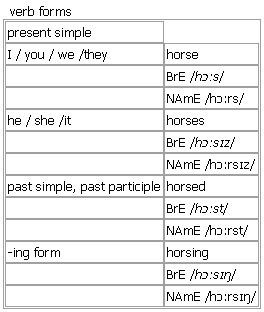 horse
horse

horse [horse horses horsed horsing] noun, verb BrE [hɔːs] NAmE [hɔːrs]
noun
1. a large animal with four legs, a ↑mane (= long thick hair on its neck) and a tail. Horses are used for riding on, pulling ↑carriages, etc
• He mounted his horse and rode off.
•a horse and cart
see also ↑colt, ↑filly, ↑foal, ↑gelding, ↑mare, ↑stallion
2. the horsesplural (informal)horse racing
• He lost a lot of money on the horses (= by gambling on races).
3. = ↑vaulting horse
see also ↑clothes horse, ↑hobby horse, ↑Quarter Horse, ↑rocking horse, ↑sea horse, ↑stalking horse, ↑Trojan horse, ↑white horses
more at back the wrong horse at ↑back v., close, etc. the barn door after the horse has escaped at ↑barn n., put the cart before the horse at ↑cart n., change horses in midstream at ↑change v., a dark horse at ↑dark adj., drive a coach and horses through sth at ↑drive v., eat like a horseI could eat a horse at ↑eat, flog a dead horse at ↑flog, look a gift-horse in the mouth at ↑gift n., be/get on your high horse at ↑high adj., close, lock, etc. the stable door after the horse has bolted at ↑stable door n., wild horses would not drag, make, etc. sb at ↑wild adj., if wishes were horses, beggars would/might ride at ↑wish n.
Word Origin:
Old English hors, of Germanic origin; related to Dutch ros and German Ross.
Example Bank:
•He got a part as the rear end of a pantomime horse.
•He urged his horse into a gallop.
•He was jailed for 15 years for nobbling a horse that had been going to run in the Derby.
•He was mounted on the finest horse you could ever see.
•He won second prize in a horse show.
•Heavy horses were used for delivering beer.
•Hundreds of animals are bought and sold at the annual horse fair.
•Several horses trotted past us.
•She has a knack for handling horses.
•The brewery had 25 heavy horses delivering beer in London.
•The car in front was pulling a horse box.
•The cart overturned, the horse plunging and rearing in its traces.
•The horse stumbled and threw its rider.
•The horse trough was full of stagnant water.
•The race organizers became suspicious when the two most fancied horses finished last.
•The weary horse plodded up the hill.
•There are ten horses running in the next race.
•They collected tissue samples for cloning from 75 champion horses.
•They passed an old horse pulling a cart full of apples.
•They would need fresh horses if they were to reach the border the next day.
•Three horses fell when a loose horse ran across the track.
•horse-drawn vehicles
•political horse-trading
Idioms: ↑from the horse's mouth ▪ ↑hold your horses ▪ ↑horses for courses ▪ one/two/three horse race ▪ ↑you can lead a horse to water, but you can't make it drink
Derived: ↑horse about
verb
Verb forms: 
Word Origin:
Old English hors, of Germanic origin; related to Dutch ros and German Ross.
|
|
